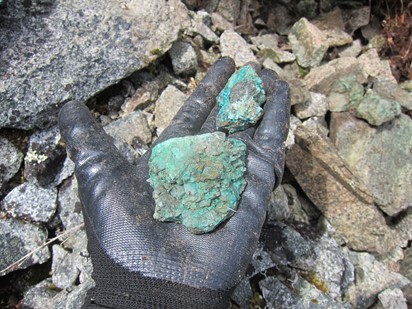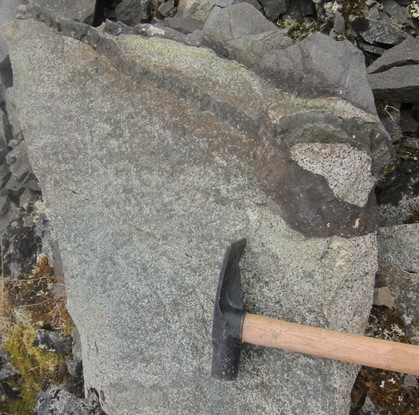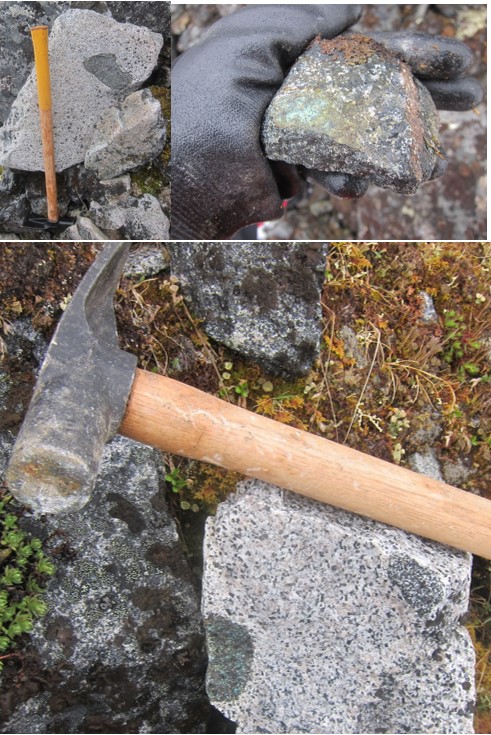Trailbreaker Resources Completes Phase 1 Exploration At The Atsutla Gold Project, Mobilizes To Skelly
July 19th, 2021 – Trailbreaker Resources Ltd. (TBK.V) (“Trailbreaker” or “the Company”) is pleased to announce completion of the Phase 1 exploration program at its 100%-owned Atsutla Gold project, located in northwestern British Columbia (BC). Trailbreaker will also conduct an exploration program at its 100%-owned Skelly property in 2021.
The Atsutla Gold project covers over 23,000 hectares and is located 70 km south of the Yukon-BC border and 130 km northwest of the community of Dease Lake, BC.
The Phase 1 exploration program involved the collection of 1,680 soil samples and 295 prospecting grab samples, as well as geological mapping. Efforts were focused on follow-up of the high-grade gold, silver, and copper discoveries made at the Willie Jack property in 2020 (see below for further details), as well as first-pass reconnaissance of newly-staked, unexplored ground southeast of the initial discoveries. The exploration team also completed a first-pass exploration program at the Swan property, which hosts a historic molybdenum-copper (Mo-Cu) porphyry showing that has never been assayed for gold mineralization.
Assay results for the Phase 1 program remain pending. A Phase 2 exploration program will commence in August, 2021.
Skelly property
Prior to conducting Phase 2 exploration at Atsutla, the Trailbreaker team will mobilize on to its 100%-owned Skelly property in northwestern BC. Covering 2,526 hectares, the Skelly property is located just south of the Yukon-BC border, approximately 100 km southwest of Whitehorse, Yukon.
The property is contiguous to Bessor Minerals’ 8,178-hectare Golden Eagle property that contains significant drilled gold prospects comprising high-grade, gold-bearing quartz-sulphide veins. Although exploration on the Skelly property dates back to the 1890s, old shafts provide the only evidence of past work. Before 2020, no modern exploration has been documented on the majority of the Skelly property.
In the summer of 2020, Trailbreaker conducted a short, 3-day first pass reconnaissance exploration program that re-identified historic shafts. Grab samples obtained from quartz veins within these assayed up to 1.03 oz/ton gold and 14.24 oz/ton silver (see October 5th, 2020 news release for more information). The auriferous quartz veins were sampled over a 100-metre northwest-trending shear zone, open along strike and paralleling a contact with granitic rocks. Soil sampling revealed a property-wide enrichment in gold (Au), arsenic (As) and antimony (Sb), with values up to 63.4 ppb Au, 5,218 ppm As and > 2,000 ppm Sb. On receiving these results Trailbreaker immediately extended its land package to cover all new targets for potential mineralization.
The 2021 exploration program will involve follow-up on the 2020 discoveries, as well as first-pass exploration on the newly-staked ground.
Further information on the Atsutla Gold project:
Willie Jack
In March of 2020, the Trailbreaker team generated the Willie Jack target and conducted a first pass reconnaissance program. The program led to the discovery of widespread gold mineralization across a 6-kilometre trend, with rock grab samples assaying up to 164 g/t (4.78 oz/ton) Au and soil sample results exceeding 800 ppb (0.8 g/t) Au (see Willie Jack news release dated October 19th, 2020). Rock grab samples also returned assays up to 257 g/t silver (Ag) and 1.7 % copper (Cu). The mineralization discovered to date is related to the Mesozoic intrusive batholiths that comprise the Atsutla mountain range, and shares characteristics of both Cu-Au porphyry-type and intrusion-related gold deposits. Further work is required to determine the nature of the gold mineralization.
Swan
Due to the success of the first pass results at the Willie Jack property, Trailbreaker generated and staked the Swan property which now covers over 13,000 hectares (see Swan news release dated March 22nd, 2021). The Swan claims cover a historical molybdenum porphyry prospect discovered in the late 1960s and periodically explored since then. Despite more than 500 soil and surface rock samples and almost 1,000 meters of shallow diamond drilling, no geochemical analysis for gold was ever completed. Historical geological mapping and drill hole logging indicate a complex intrusive system, comprising widespread quartz-feldspar porphyritic monzonite cut by a variety of felsic and mafic dikes. Molybdenite-pyrite mineralization is closely associated with sheeted quartz veins, quartz stockwork and breccia zones. The historical drilling at Swan intersected broad, low to mid-grade molybdenite mineralization, returning up to 0.06% Mo over 73 metres, as well as several significant silver intercepts including >26 g/t Ag over 3 meters.
Historical work also included a detailed soil geochemical survey completed in 2007 which outlined a large, open-ended copper-silver-arsenic (Cu-Ag-As) soil anomaly that lies outside of the drilled Mo prospect. Furthermore, a 1972 induced polarization (IP) survey outlined a chargeability anomaly coinciding with this soil anomaly, interpreted to potentially represent a pyrite halo above a buried porphyry system.
Trailbreaker’s team has concluded that the Swan and Willie Jack property areas were previously overlooked for gold potential, due to low gold prices at the time.
Message from the President
“The Phase 1 exploration program at Atsutla was incredibly effective at collecting a vast quantity of data during a short time period. The Trailbreaker team and myself look forward to receiving the assay results, compiling them and moving forward with a second phase in August. We are also about to commence an exploration project at the Skelly property, an area with very little past exploration but showing great promise due to the historic showings on the property, and high gold values from neighbouring properties.”
ON BEHALF OF THE BOARD
Daithi Mac Gearailt
President and Chief Executive Officer
Carl Schulze, P. Geo., Consulting Geologist with Aurora Geosciences Ltd, is a qualified person as defined by National Instrument 43-101 for Trailbreaker’s BC and Yukon exploration projects, and has reviewed and approved the technical information in this release.
For new information about the Company’s projects, please visit Trailbreaker’s website at TrailbreakerResources.com and sign up to receive news. For further information, follow Trailbreaker’s tweets at Twitter.com/TrailbreakerRes, use the ‘Contact’ section of our website, or contact us at (604) 681-1820 or at info@trailbreakerresources.com.
Neither the TSX Venture Exchange nor its Regulation Services Provider (as that term is defined in the policies of the TSX Venture Exchange) accepts responsibility for the adequacy or accuracy of this release.
Forward-Looking Statements
Statements contained in this news release that are not historical facts are “forward-looking information” or “forward-looking statements” (collectively, “Forward-Looking Information”) within the meaning of applicable Canadian securities legislation and the United States Private Securities Litigation Reform Act of 1995. Forward-Looking Information includes, but is not limited to, disclosure regarding possible events, conditions or financial performance that is based on assumptions about future economic conditions and courses of action; expectations regarding future exploration and drilling programs and receipt of related permitting. In certain cases, Forward-Looking Information can be identified by the use of words and phrases such as “anticipates”, “expects”, “understanding”, “has agreed to” or variations of such words and phrases or statements that certain actions, events or results “would”, “occur” or “be achieved”. Although Trailbreaker has attempted to identify important factors that could affect Trailbreaker and may cause actual actions, events or results to differ materially from those described in Forward-Looking Information, there may be other factors that cause actions, events or results not to be as anticipated, estimated or intended. In making the forward-looking statements in this news release, if any, Trailbreaker has applied several material assumptions, including the assumption that general business and economic conditions will not change in a materially adverse manner. There can be no assurance that Forward-Looking Information will prove to be accurate, as actual results and future events could differ materially from those anticipated in such statements. Accordingly, readers should not place undue reliance on Forward-Looking Information. Except as required by law, Trailbreaker does not assume any obligation to release publicly any revisions to Forward-Looking Information contained in this news release to reflect events or circumstances after the date hereof or to reflect the occurrence of unanticipated events.


